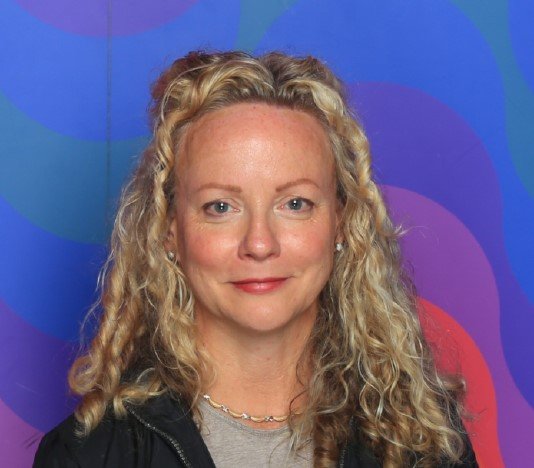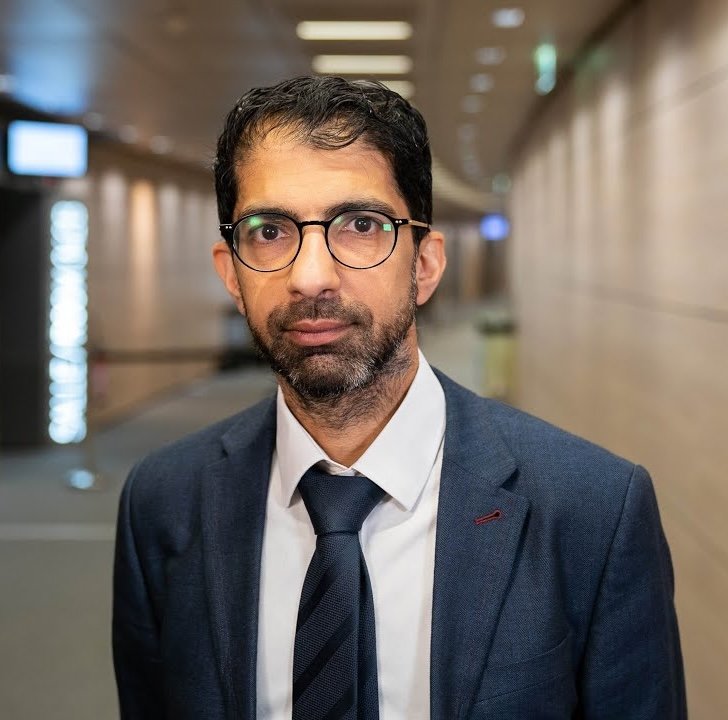Meet Emma and Tariq, two healthcare professionals who have transitioned from clinical roles to becoming innovators in the field. Emma has developed the Keep On Keep Up (KOKU) project, a digital falls prevention program aimed at helping older adults stay safe and active. Tariq has created the Rafi-Tone app, a gamified solution to make inhaler use easier for children.
These case studies unravel their journeys, highlighting the challenges and successes they faced along the way. Discover how their innovative solutions are making a real-world impact and gain valuable insights into the importance of collaboration and recognition in healthcare innovation.
The Innovators and their innovations

KOKU Health: Enhancing Independence and Reducing Falls in Older Adults
The KOKU Health Digital Falls Prevention programme, developed by Prof Emma Stanmore and her team at the University of Manchester, is a digital health app designed to help older adults prevent falls and maintain their independence. Although KOKU, in its current state, is not considered as a Software as Medical Device (but rather a digital health platform), many of the translational steps outlined in the toolkit were applied during its development. This innovative solution combines gamification and health behaviour change theory to deliver personalized, progressive strength and balance exercises. The app is based on the evidence-based OTAGO and FaME exercise programmes, which have been shown to reduce falls by up to 42%.
KOKU Health has been tested in various locations, including Greater Manchester, Nottingham, and Texas, demonstrating high usability and positive outcomes in balance, strength, and confidence among older adults. The app also includes health literacy games to improve awareness of bone health, nutrition, home safety, and hydration. With funding from NHS England, KOKU Health is being scaled up and has received high approval ratings from health app evaluation organizations, including ORCHA (Organisation for the Review of Care and Health Apps), which assesses the safety and quality of digital health technologies.
Impact: The impact of KOKU Health has been significant, with users reporting improved physical capabilities and confidence in their daily activities. The programme has successfully reduced the risk of falls, thereby enhancing the quality of life for older adults. By integrating clinical expertise with innovative technology, KOKU Health addresses a critical health challenge and provides a scalable solution that can be implemented globally to support healthy ageing.
Hear about this project directly from Emma in the video below. More info on the KOKU health website.
Rafi-Tone: Making Inhaler Use Fun and Effective for Children
Rafi-Tone is an innovative mobile app developed by Prof Tariq Aslam and his team at Clin-e-cal, designed to help young children use inhalers with spacers more effectively. Inspired by Prof Aslam's personal experience with his son, the app combines gamification with sound detection technology to create an engaging and educational experience for children with asthma or other respiratory conditions. The app works alongside the Able Spacer and whistle mask, using Sound Response® technology to detect correct breathing techniques.
Rafi-Tone has garnered positive feedback and support, including successful crowdfunding efforts to further develop and expand its reach. The app exemplifies how innovative technology can address real-world health challenges, making a significant difference in the lives of children with respiratory conditions. Future plans include expanding its features and accessibility to reach more children globally. Although Rafi-Tone, in its current state, is not considered as a Software as Medical Device, many of the translational steps outlined in the toolkit were applied during its development. The app is currently available on prescription or from pharmacists.
Impact: The app has been well-received by both parents and healthcare professionals. Children using Rafi-Tone are more likely to adhere to their inhaler regimen, reducing the likelihood of asthma attacks and improving overall respiratory health. The app has spawned a similar technology that addresses inhaler compliance in adults too, with proven effectiveness in a randomised control NIHR funded clinical trial. By transforming a stressful routine into a fun activity, Rafi-Tone significantly enhances the quality of life for children with asthma.
Hear about this project directly from Tariq in the video below.

Words of Advice
We have recorded a podcast with Emma and Tariq discussing their experiences in healthcare innovation. In the podcast, Emma and Tariq delve into the challenges of integrating clinical expertise with innovative technology to create impactful health solutions. They emphasize the importance of collaboration between clinicians and researchers, the need for real-world impact beyond academic publications, and the critical role of user-centered design in developing effective health technologies.
Emma and Tariq also offer valuable advice for those starting in health technology research and innovation: persistence is key! Initial setbacks can be discouraging, but finding alternative routes and staying committed to the problem is crucial. They highlight the importance of understanding the landscape and potential barriers early on, and the need for a long-term strategy that considers the entire translational pathway, including aspects like funding, intellectual property, and commercialization.
While the journey can be challenging, focusing on the real-world impact of innovations is essential for achieving success. Emma and Tariq stress the importance of networking, finding like-minded individuals, and building a support network to navigate the complexities of healthcare innovation.
You can listen to extracts from Emma and Tariq's podcast below. A link to the full podcast will be provided on this page once released as part of the Health Care Matters Podcast Series from the Christabel Pankhurst Institute.
"Innovation often starts with identifying unmet needs in clinical practice and finding creative solutions. Staying committed despite setbacks is crucial for success."
Professor Emma Stanmore
Navigating Intellectual Property in Healthcare Innovation
Intellectual property (IP) protection is a key aspect of healthcare innovation. Both case studies highlight the need to record, protect IP, and map out contributions early in the development process. Additionally, the case studies emphasise the importance of balancing the need for publication with the necessity of protecting IP, noting that early IP protection is crucial for successful commercialisation. Seeking advice and support from technology transfer offices and IP experts is essential in provide crucial guidance on protecting intellectual property and navigating the complexities of IP management. Early engagement with these experts helps innovators understand the legal and procedural aspects of IP, secure necessary protections, and ultimately bring their innovations to market more effectively.
Entrepreneurship, Motivation, and Perseverance in Healthcare Innovation
Entrepreneurship, motivation, and perseverance are key requirements to succeed in healthcare innovation. These case studies highlight the importance of being passionate about solving real-world problems and staying motivated despite challenges. Innovation often starts with identifying unmet needs in clinical practice and finding creative solutions. Initial setbacks are common, but perseverance and staying committed to the cause is crucial for success. It is the strong motivation to make a difference to drive innovation, alongside the need for personal investment, and being prepared for a challenging journey, including the importance of choosing the right innovations and being ready to pivot if necessary. Networking and finding like-minded individuals is also key to help navigating the complexities of healthcare innovation.
"A strong motivation to make a difference can drive innovation. Be prepared for a challenging journey and ready to pivot if necessary."
Professor Tariq Aslam
Early Business Model, Opportunity, and Clinical Need in Healthcare Innovation
Thinking of potential business models, identifying suitable opportunities, and addressing unmet clinical needs are critical aspect of healthcare innovation. Understanding the landscape through networking and literature review is key to ensure that innovations address genuine needs and are not redundant. Thorough initial investigation can prevent wasted time and effort later on. It is important to not neglect the business model aspect early in the innovation process as this can lead to challenges later when the innovation is ready to be commercialised. Innovators should consider the potential market and feasibility of their ideas from the outset. The case studies also highlight the importance of collaboration with clinicians who understand the clinical needs, but may lack the time or technical know-how to move things forward. Ensure that the innovation makes a meaningful difference to patients can drive motivation and support from stakeholders.
Key Insights for Aspiring Healthcare Innovators
Emma and Tariq provide valuable nuggets of information for those embarking on their clinical innovation or healthcare innovation journey. Innovators are advised to be aware of the broader challenges ahead and to be prepared to invest a lot of personal time and emotions into their projects. Choosing the right innovations to pursue and being prepared for potential failure is also important as most innovators have multiple ideas, and it's crucial to decide which ones to focus on and dedicate effort to. Talking to as many people as possible to validate the need for the innovation is key to success, as well as understanding whether there is a genuine unmet need and if people really want the solution being developed. This initial validation can save a lot of time and energy and help innovators meet the right networks and experts along the way. Both case studies highlight the need for an entrepreneurial spirit, the ability to pivot, and the importance of testing ideas early in the innovation process.
Explore these case studies in full to learn more about the innovative work being done at the University of Manchester and its impact on healthcare by listening to the Health Care Matters Podcast Series from the Christabel Pankhurst Institute.

